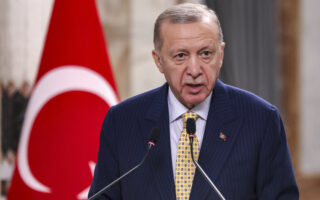A dialogue between Kathimerini and Milliyet
The top editors of two major newspapers in Greece and Turkey continue their initiative for dialogue, each addressing the other’s readers

What is the criterion for success in Greek-Turkish relations?
Ozay Sendir, Editor-in-chief of Milliyet
Greek Prime Minister Kyriakos Mitsotakis will be in Turkey on Monday. From this side of the Aegean Sea, many people liked it when the prime minister said “Welcome” to the Turkish tourists who visited the island of Lesvos. His delegation will easily sense the sympathy that the Mitsotakis name has acquired on the streets. As citizens on both sides of the Aegean, we have one thing in common: We rejoice at even a small kind gesture, feeling the same excitement of brothers who were at loggerheads for years before reconciling again. This shared feeling is actually our strong point.
While the excitement is there, so is the reality. Not all problems will be solved by the two leaders. They won’t even say we agreed on the number of issues we can’t agree on. The next steps will be to continue the great success of Ankara and Athens in maintaining a tension-free environment and maintaining open channels of dialogue. We need to understand this positive agenda well, as the two countries have not changed their positions on their problems. As we maintain a dialogue, we will understand each other’s points of view, each other’s concerns and problems, and it will be easier to solve problems. These mutual visits, meetings and direct contacts may not bring any immediate result. But it’s not a waste of time. As we come closer as peoples, as we establish business contacts and partnerships, as the voices of our desire for peace grow louder, the coming of peace will become easier. We are currently in the process of bringing together people, nongovernmental organizations and the business world.
On May 1, I met the Greek prime minister at Maximos Mansion. It was a short but warm meeting where the conversation even reached my friends’ posts on social networks who were learning sirtaki in Istanbul. It was a beautiful day because the taxi driver who took this Turkish journalist to Maximos Mansion, during the hours when traffic in Athens was difficult, was in good mood. There was a warm welcome by Aristotelia Peloni [the prime minister’s adviser], whom I admire for her excellent professional attitude and discipline in her work at the prime minister’s office. It was a beautiful day also because right at the beginning of Ermou Street, I was talking about Istanbul with the lady who sells sesame bread rings. After all that, I had a bad experience at the airport in the smoking section. Someone who saw the Turkish passport in my hand when I asked if I could sit on the empty stool next to him said no. I wondered if maybe he was waiting for someone, but no, he smoked a couple of cigarettes, then left looking at my passport. I was sad, not for myself, but for the person who lives with this hatred. In Nikos Kazantzakis’ novel “Zorba the Greek,” the English teacher is quoted as saying, “If I had had to choose between falling in love with a woman and reading a book about love, I should have chosen the book.” And this is such a situation.
Entrenched enmity is easier than venturing for peace. In the journey for peace, we will surely meet people on both sides of the Aegean who are afraid to break their habits, and instead of getting angry at what is happening to them, the best response will be to feel sorry for them. Let’s be realistic, our population is aging, we need more hospitals, more doctors. We need more classes and more education. The idea of spending the billions of euros that we spend on armaments on our elderly and our children passes through peace.
Dear Prime Minister, welcome to Turkey.
Let’s maintain the routine of calmness
Alexis Papachelas, Executive editor of Kathimerini
In Greek-Turkish relations, the periods when calmness prevailed are few and far between. Since 1983, when I started working in journalism, I can count these exceptions on the fingers of one hand. What is important today is that the two governments are talking at many levels, summit meetings are planned and communication channels have been opened. At a time when our region is on fire, it is very important and positive that Greece and Turkey are going through a phase of peaceful coexistence.
There are certainly actions that concern us here in Athens, like the conversion of the historic Monastery of Chora into a mosque, just a few days before the Greek prime minister’s visit to Ankara. No one would think, much less do, something similar in Greece – that is, turn a historic mosque into a church. After all, we have reached a point where neither of us should feel insecure. On the contrary, it is a sign of self-confidence and respect to protect significant monuments without changing their identity.
It will require maturity on both sides of the Aegean to avoid falling back into the trap of tensions and nonexistent communication channels. Many would want that, and it is very easy to fall back into our good old routine. The upcoming meeting of the two leaders of Greece and Turkey will show whether there is the potential for further improvement and flourishing of the relationship. Because, let’s not forget, it is also rare to have both countries ruled by leaders who have received a strong mandate in the elections and are not threatened by anyone.




